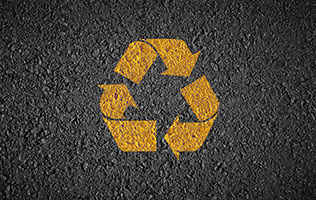 2 October 2020
2 October 2020
Council-supported research on recycled road material usage will help environment and economy
A push towards new jobs in a circular economy is a key driver behind new research on the use of recycled materials in roads and footpaths, Local Government NSW (LGNSW) President Linda Scott said today.
Cr Scott said the LGNSW-funded research undertaken by Sydney University was designed to facilitate the same sort of home-grown approach to recycling and job creation as the Federal Government’s new $1.5 billion Modern Manufacturing Strategy, which includes a priority focus on recycling.
“Making and using recycled materials for roads and pavement is exactly the kind of innovative manufacturing the federal strategy is talking about,” she said.
“This research has produced a comprehensive guide that will make the process easier for councils, with the added benefits of better environmental outcomes and the creation of sustainable new jobs in the local recycled materials manufacturing sector.”
Cr Scott said the University of Sydney research provided a technical overview for council engineers on how to best use recycled plastics, glass, asphalt, concrete and other materials to make safe and durable roads and pavement.
“LGNSW has long advocated for an overhaul of the State’s waste and recycling management that recognises the need to transition to a circular economy, where waste is seen as a product, not a problem,” she said.
“Practical action such as this guide has never been more necessary, with impending waste export bans resulting in the desperate need to find alternative uses to waste and recycled material.
“The research confirms the lead role councils play in recycling and waste management – not just collecting it, but also re-using it.
“And it is a critical issue. In 2017-18 alone, NSW generated more than 21 million tonnes of waste, which is expected to grow to more than 31 million tonnes over the next 20 years.
“With the option of shipping waste overseas no longer open to Australia, we have to find a viable alternative to deal with it. Reusing it as a resource through research such as this not only fosters innovation, but it also creates new jobs, new economic streams and, of course, is better for our environment.”
LGNSW provided University of Sydney’s Waste Transformation Research Hub research team with $50,000 through its Research and Innovation Fund to produce a guide on the technical processes involved in turning recycled material into roads and pavements.
“LGNSW is proud to support this type of innovation as part of its leadership around waste and recycling management,” Cr Scott said.
“I congratulate the University of Sydney research team – Associate Professor Ali Abbas, Dr Amirali Ebrahimi Ghadi and Associate Professor Daniel Dias-da-Costa – for their outstanding work.”
Cr Scott said NSW councils were committed to playing a lead role dealing with the rising crisis of waste and recycling.
“Councils are leading the way when it comes to dealing with the one-two punch of increasing waste and shrinking options to deal with it,” she said.
“We are starting to see innovative initiatives such as Paving the Way, a collaboration of 15 Sydney metropolitan councils that have joined forces to recycle nearly 100 million glass containers a year into local roads.
“This project represents the biggest local government-led procurement of recycled road-making materials in NSW history.
“We also welcome initiatives such as the $190 million Recycling Modernisation Fund, designed to tackle impending international deadlines for exporting rubbish and recycling.
“And LGNSW has taken a lead role for a viable way forward on behalf of councils with initiatives such as the Research and Innovation Fund, which is already yielding results.
“And we continue to call on the NSW Government to urgently address the dire state of the State’s outdated waste and recycling infrastructure and policies through our Save Our Recycling campaign.
“This includes a comprehensive plan for the NSW Government to put the $800 million it collects annually through its Waste Levy to good use by supporting councils to strengthen recycling services and build a circular economy in NSW.”
Outcomes from the research, including the guide for using recycled materials for roads and pavement, can be found here.
Media Enquiries
Scott Maclean: 0448 718 892
BACK TO ALL NEWS